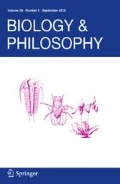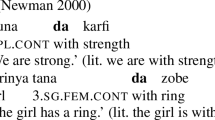Abstract
I outline the debate in metaphysics between those who believe time is tensed and those who believe it is tenseless. I describe the terms in which this debate has been carried out, and the significance to it of ordinary tensed language and widespread common sense beliefs that time is tensed. I then outline a case for thinking that our intuitive beliefs about tense constitute an Adaptive Imaginary Representation (Wilson, in Biol Philos 5:37–62, 1990; Wilson, in Biol Philos 10:77–97, 1995). I also outline a case for thinking that our ordinary tensed beliefs and tensed language owe their tensed nature to its being adaptive to adopt a temporally self-locating perspective on reality. If these conclusions are right, then common sense intuitions and temporal language will be utterly misleading guides to the nature of temporal reality.
Similar content being viewed by others
Notes
This is not the place for an examination of McTaggart’s paradox. For discussion I refer the reader to some of the following citations. There is some disagreement, even among B-theorists, as to whether this argument ultimately succeeds. B-theorists who think it does include Le Poidevin (1991), Mellor (1981), Oaklander (1984) and Dyke (2002a). B-theorists who are skeptical about the success of McTaggart’s paradox include Sider (2001) and Savitt (2000).
Although there are some exceptions. See, for example, Fiocco (2007).
I develop this argument in more depth in Dyke (2012, forthcoming).
Linguists use the term ‘deictic’ to describe context-dependent expressions.
I am grateful to two anonymous referees for this journal for drawing these objections to my attention.
However, not all linguists treat the perfect as a tense, treating it instead as an aspect (Comrie 1976, 6).
As should be clear from the preceding discussion, ‘tensed sentence’ here is not restricted to grammatically tensed sentences, but refers to any sentence that, by whatever means, locates some event in either the past, present or future. Conversely, ‘tenseless sentence’ refers to any sentence that carries no implications for the A-series location of any event. Examples of tenseless sentences include “2 + 2 = 4”, and “E1 occurs (tenseless, not present tense) before E2”.
The existence of tenseless natural languages does not support the early B-theorists’ claim that language could be detensed, as those languages have other means of locating events in the past, present and future so they are not tenseless in the requisite sense. Neither, for the same reason, does the existence of such languages undermine the widely accepted view that tense cannot be eliminated from language without loss of meaning.
I develop this position in much greater detail in Dyke (2008).
I am grateful to Hugh Mellor for suggesting this example to me.
References
Bourne C (2006) A future for presentism. Oxford University Press, Oxford
Campbell DT (1974) Evolutionary epistemology. In: Schilpp PA (ed) The philosophy of Karl popper, I. Open Court, La Salle, Ill
Comrie B (1976) Aspect. Cambridge University Press, Cambridge
Comrie B (1985) Tense. Cambridge University Press, Cambridge
Craig WL (2000) The tensed theory of time: a critical examination. Kluwer Academic Publishers, Dordrecht
Dainton B (2001) Time and space. McGill-Queens University Press, Montreal
Dawkins R (2006) The Selfish Gene: 30th anniversary edition. Oxford University Press, Oxford
Dennett D (1978) Why the law of effect will not go away. Chapter 5 of Brainstorms. MIT Press, Cambridge Mass
Dyke H (2002a) McTaggart and the truth about time. In: Callender C (ed) Time, reality and experience. Cambridge University Press, Cambridge, pp 137-152
Dyke H (2002b) Tokens, dates and tenseless truth conditions. Synthese 131(3):329–351
Dyke H (2003a) Tensed meaning: a tenseless account. J Philos Res 28:65–81
Dyke H (2003b) Temporal language and temporal reality. Philos Q 53(212):380–391
Dyke H (2008) Metaphysics and the representational fallacy. Routledge, New York
Dyke H (2012, forthcoming) On methodology in the metaphysics of time. In: Bardon A (ed) The future of the philosophy of time. Routledge, New York
Evans N, Levinson SC (2009) The myth of language universals: language diversity and its importance for cognitive science. Behav Brain Sci 32:429–492
Fiocco MO (2007) A defense of transient presentism. Am Philos Q 44:191–212
Gale R (1968) The language of time. Routledge and Kegan Paul, London
Goodman N (1951) The structure of appearance. Harvard University Press, Cambridge Mass
Hornstein N (1990) As time goes by: tense and universal grammar. MIT Press, Cambridge Mass
Huemer M (2005) Ethical intuitionism. Palgrave Macmillan, Basingstoke
Kahane G (2011) Evolutionary debunking arguments. Noûs 45(1):103–125
Ladyman J, Ross D, Collier J, Spurrett D (2007) Every thing must go: metaphysics naturalized. Clarendon Press, Oxford
Le Poidevin R (1991) Change, cause and contradiction. Macmillan, Basingstoke
Ludlow P (1999) Semantics, tense, and time: an essay in the metaphysics of natural language. MIT Press, Cambridge Mass
Maclaurin J, Dyke H (2002) Thank goodness that’s over: the evolutionary story. Ratio 15(3):276–292
Markosian N (2004) A defense of presentism. In: Zimmerman D (ed) Oxford studies in metaphysics, vol I. Clarendon Press, Oxford, pp 47–82
McTaggart JME (1927) The nature of existence, vol 2. Cambridge University Press, Cambridge
Mellor DH (1981) Real time. Cambridge University Press, Cambridge
Mellor DH (1998) Real time II. Routledge, London
Oaklander LN (1984) Temporal relations and temporal becoming: a defense of a Russellian theory of time. University Press of America, Lanham, MD
Paul LA (2010) Temporal experience. J Philos 107(7):333–359
Popper KR (1972) Objective knowledge: an evolutionary approach. Clarendon Press, Oxford
Quine WVO (1960) Word and object. MIT Press, Cambridge Mass
Russell B (1915) On the experience of time. Monist 25(2):212–233
Savitt S (2000) A limited defense of passage. Am Philos Q 38(3):261–270
Schlesinger G (1980) Aspects of time. Hackett, Indianapolis
Sider T (2001) Four-dimensionalism: an ontology of persistence and time. Clarendon Press, Oxford
Smart JJC (1963) Philosophy and scientific realism. Routledge and Kegan Paul, London
Smart JJC (1980) Time and becoming. In: van Inwagen P (ed) Time and cause. D. Reidel, Dordrecht, pp 3–15
Smith Q (1993) Language and time. Oxford University Press, New York
Spelke ES, Phillips A, Woodward AL (1995) ‘Infants’ knowledge of object motion and human action. In: Sperber D, Premack D, James Premack A (eds) Causal cognition. Oxford University Press, Oxford, pp 44–78
Tooley M (1997) Time, tense and causation. Oxford University Press, Oxford
Wilson DS (1990) Species of thought: a comment on evolutionary epistemology. Biol Philos 5:37–62
Wilson DS (1995) Language as a community of interacting belief systems: a case study involving conduct toward self and others. Biol Philos 10:77–97
Wilson DS (2002) Darwin’s Cathedral: evolution religion and the nature of society. University of Chicago Press, Chicago
Wolpert L (1992) The unnatural nature of science. Harvard University Press, Cambridge Mass
Acknowledgments
I am grateful to audiences at the Future of the Philosophy of Time conference, Wake Forest University, April 2010, and the Australasian Association of Philosophy conference, University of New South Wales, July 2010, for helpful comments. I’m also grateful to James Maclaurin and two anonymous referees for this journal for suggesting many improvements.
Author information
Authors and Affiliations
Corresponding author
Rights and permissions
About this article
Cite this article
Dyke, H. The evolutionary origins of tensed language and belief. Biol Philos 26, 401–418 (2011). https://doi.org/10.1007/s10539-011-9263-5
Received:
Accepted:
Published:
Issue Date:
DOI: https://doi.org/10.1007/s10539-011-9263-5




